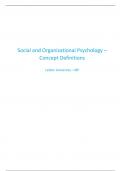Social and Organizational Psychology –
Concept Definitions
Leiden University – IBP
, Organizational Psychology
Chapter 1
Conceptual skills Analyse, diagnose, cause and effect
Contingent workers People employed for temporary periods by an
organization and who receive no benefits such as health
insurance or pensions
Controlling Evaluate, take actions if performance off
Diversity Individual differences resulting from age, gender, race,
ethnicity, religion, sexual orientation, and socioeconomic
background
Downsizing lay off managers and workers to reduce costs
Empowerment giving employees throughout an organization the
authority to make important decisions and to be
responsible for their outcomes
Ethics values, beliefs, and moral rules that managers and
employees should use to analyze or interpret a situation
Ethical dilemma Decision if one should act in a way that might benefit
other people or groups, “right”, even though doing
so might go against one’s own and their
organization’s
interests
Expatriate managers Managers overseas, responsible for developing
relationships with organizations in countries around the
globe
Freelancers People who contract with an organization to perform
specific services
Global organizations Companies that produce or sell their products in
countries and regions throughout the world
Global learning acquiring and learning the skills, knowledge, and
organizational behaviours and procedures that have
helped companies abroad become major global
competitors
Group Two or more people who interact to achieve their goals
Human skills Understand, work with, lead, control others
, Information technology computer and communications hardware and software,
and the skills of their designers, programmers, managers,
and technicians
Leading Encourage and coordinate employees to achieve goal
Management planning, organizing, leading, and controlling an orga’s
human, financial, material, and other resources to
increase its effectiveness.
Managers Plan, organize, lead, control
National culture set of values or beliefs that a society considers important
and the norms of behaviour that are approved or
sanctioned in that society
Open system Input -> Conversion -> Output
Organizing Establishing rules, reporting RS
Organization collection of people who work together and coordinate
their actions to achieve individual and organizational
goals
Organizational behaviour study of factors that affect how individuals and groups act
in organizations and how organizations respond to their
environments
Organizational procedure A rule or routine an employee follows to perform some
task in the most effective way
Organizational effectiveness The ability of an organization to achieve its goals
Organizational learning managing information and knowledge to achieve a better
fit between the organization and its environment
Outsourcing employing external people, groups, or a specialist
organization to perform a specific type of work activity
Planning Decide on goals, allocate and use resources
Role set of behaviours or tasks a person is expected to perform
because of the position he or she holds in a group or
organization
Self-managed teams Groups of employees who receive the authority to
structure their own organizational BH




